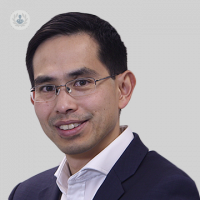Swallow syncope - what causes fainting after swallowing?
Written in association with:Syncope (pronounced sin-cope-pee) is the medical term for a loss of consciousness, which is caused by the blood supply to the brain being insufficient – in other words, fainting, or blacking out, as it is more commonly known. Syncope can be triggered by even the most common everyday situations, such as being in the heat, or after finishing a meal. There are many different types of syncope, and while some are common, there are also rarer forms. Here, Dr Boon Lim, consultant cardiologist and expert in syncope, explains swallowing syncope, and how it can be managed.

What is swallowing syncope?
Swallowing syncope is a rare form of syncope which takes place when a patient feels faint after eating. It occurs when the patient swallows food, which then causes them to faint, or pass out.
What are the symptoms and causes swallowing syncope?
The reflexes which are started or initiated at the point of swallowing are what causes syncope. Swallowing syncope is rare, and may not occur every single time a patient swallows. Certain specific situations, with all the triggers ‘lining up’ as it were, are what cause swallow syncope to occur. This might be when a patient is relatively dehydrated, and it’s a warm day. Perhaps the patient is feeling relatively tired, and they then swallow a large chunk of food which has not been chewed properly, which gets stuck at the back of the throat (oropharynx), causing a slight coughing fit as well.
This can trigger a complex reflex in which the brain then sends a signal to the heart to slow down (bradycardia) and to the vessels to pool blood (vasodilatation) which results in a low blood pressure, which causes patients to feel lightheaded, and if severe, to pass out completely. However, the mechanism behind swallow syncope is still not completely understood.
What is the treatment for swallowing syncope?
Treatment for swallow syncope focuses on the management of swallowing ‘properly’. This means taking small, bite-size pieces of food, chewing properly, and making sure to swallow at the ‘right’ moment.
Sometimes, patients will complain of swallow syncope only when eating certain types of stodgy foods (muffins, bagels) but not others (water, porridge), and in this case, often treatment is to be aware of the food types and quantities that can cause a problem and to avoid these in day to day diet.
In addition to this, the patient should make sure they are well-hydrated, and they do not find themselves in a situation where it is too warm, or too stuffy, and they are feeling unwell prior to the swallow. If the patient knows they are prone to having syncope while swallowing, then being more careful whilst swallowing and eating can help them to manage their syncope.
Can you die from swallow syncope?
It is rare that swallow syncope is life- threatening.
Will a pacemaker cure swallow syncope?
Rarely, syncope occurs unpredictably with swallowing, and if this is a recurring problem, and interferes with quality of life, AND if the heart is shown to stop / slow during swallowing associated with reproduction of syncope symptoms, then a pacemaker may be beneficial. If you are considering this, please ask for an urgent referral to see a specialist who is an expert in syncope and pacemaker implantation.
Read more about Dr Lim’s tips on managing syncope and how to prevent blackouts when you are feeling unwell: 5 top tips to help with syncope.


